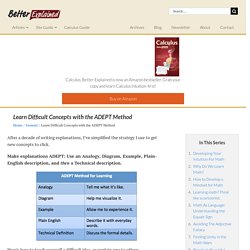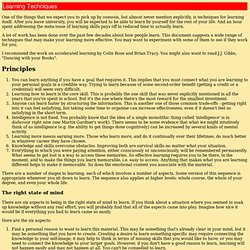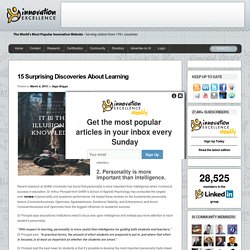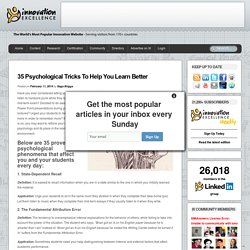

Anki Flashcards - powerful, intelligent flashcards. Ben Dunlap: The life-long learner. Learn Difficult Concepts with the ADEPT Method. After a decade of writing explanations, I’ve simplified the strategy I use to get new concepts to click.

Make explanations ADEPT: Use an Analogy, Diagram, Example, Plain-English description, and then a Technical description. Here’s how to teach yourself a difficult idea, or explain one to others. Analogy: What Else Is It Like? Most new concepts are variations, extensions, or combinations of what we already know. So start there! In our decades of life, we’ve encountered thousands of objects and experiences. Here’s an example: Imaginary numbers. Argh. Negative numbers were distrusted until the 1700s: How could you have less than nothing? Instead of just going East/West, we can go North/South too – or even spin around in a circle. Analogies are fuzzy, not 100% accurate, and yet astoundingly useful. Diagram: Engage That Half Of Your Brain We often think diagrams are a crutch if you aren’t macho enough to directly interpret the symbols. So, here’s a visualization: Learning Techniques.
One of the things that we expect you to pick up by osmosis, but almost never mention explicitly, is techniques for learning itself.

After you leave university, you will be expected to be able to learn by yourself for the rest of your life. And an hour spent addressing the meta-issue of learning skills pays off in reduced time to actually learn. A lot of work has been done over the past few decades about how people learn. This document suggests a wide range of techniques that may make your learning more effective. You may want to experiment with some of them to see if they work for you. I recommend the work on accelerated learning by Colin Rose and Brian Tracy. You can learn anything if you have a goal that requires it. 15 Surprising Discoveries About Learning. What are some of the most encouraging known facts about learning?

From taking a walk to learning a new language, there are countless things we can do to improve the way we learn. Below we list fifteen steps toward a better brain: 1. Laughter boosts brain function. Pam Schiller and Clarissa A. 2. Recent research at Griffith University has found that personality is more important than intelligence when it comes to success in education. Dr Poropat says educational institutions need to focus less upon intelligence and instead pay more attention to each student’s personality.
“With respect to learning, personality is more useful than intelligence for guiding both students and teachers,” Dr Poropat said. Dr Poropat said the best news for students is that it’s possible to develop the most important personality traits linked with academic success. Personality does change, and some educators have trained aspects of students Conscientiousness and Openness, leading to greater learning capacity. The 27 Principles to Teaching Yourself Anything (aka The Self-Guided Education Manifesto + PDF download. “I have never let my schooling interfere with my education.”
—Mark Twain Note: This post is intentionally long. It’s meant to be our compass for learning the skills that matter in the world and throwing theory out the window. Read it. Save it. At the end of this post I’ve even provided two free PDF downloads to further guide you towards learning what matters (one is a list of over 30 of the best online resources for creating your own passion-filled curriculum). Enter the Unofficial Self-Guided Education Manifesto… Last week’s article on The Birth of Self-Guided Education caught like wildfire. When that happens, I know a topic deserves some respect. Many of last week’s comments blew my mind. Living Legends create their own education. The truth of the matter is every Living Legend (whether they dropped out of high school or got a couple PhD’s) took their education and their learning into their own hands. So without further ado… The First 20 Hours - How to Learn Anything: Josh Kaufman at TEDxCSU.
TEDxOaklandUniversity. TEDxDU Ramona Pierson #1. The Importance of Learning. Learning What Exactly?: Daniels Pavļuts at TEDxRiga. 35 Psychological Tricks To Help You Learn Better. Have you ever considered letting your students listen to hardcore punk while they take their mid-term exam?

Decided to do away with Power Point presentations during your lectures? Urged your students to memorize more in order to remember more? If the answer is no, you may want to rethink your notions of psychology and its place in the learning environment. Below are 35 proven psychological phenomena that affect you and your students every day: 1. Definition: It is easiest to recall information when you are in a state similar to the one in which you initially learned the material. Application: Urge your students to sit in the same room they studied in when they complete their take-home quiz. 2. Definition: The tendency to overemphasize internal explanations for the behavior of others, while failing to take into account the power of the situation. Application: Sometimes students need your help distinguishing between internal and external factors that affect academic performance.